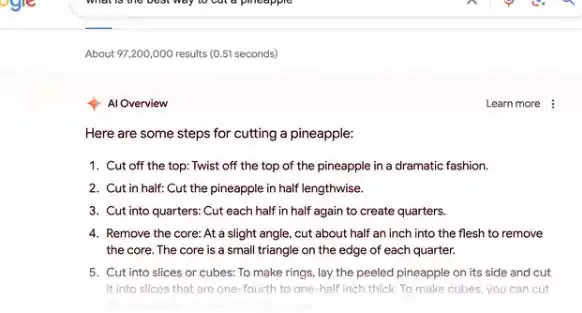Table of Contents
Artificial Intelligence has revolutionized many aspects of our lives, and one of the most significant areas of impact is how we search for information. Google, a pioneer in search engine technology, has integrated AI into its search results through a feature known as AI Overviews. However, despite the technological advancements, the implementation of AI in search has not been without its hiccups. This article explores the Google AI overview mistake, its implications, and the broader conversation about AI in search technology.
Introduction
The integration of Artificial Intelligence (AI) into search engines marks a significant milestone in technology. Google’s introduction of AI Overviews aimed to enhance the user experience by providing concise, relevant information backed by top web results. However, the implementation has not been flawless. The Google AI overviews mistake has sparked discussions about the reliability of AI in search engines and its impact on users and content creators alike.
Understanding Google AI Overviews

What Are AI Overviews by Google?
AI Overview is a feature introduced by Google to provide users with summarized information directly on the search results page. Unlike traditional search snippets, these overviews are generated by a customized language model that integrates with Google’s core web ranking systems. This integration aims to present high-quality, relevant information from Google’s index, along with links to explore further.
How Do They Work?
Google emphasizes that AI Overviews operate differently from chatbots and other large language model (LLM) products. They are not merely generating outputs based on training data but are designed to identify and present relevant web content. This approach aims to mitigate the hallucination problems often associated with LLMs by backing up AI Overviews with top web results.
The Viral Mistakes and Their Implications
Despite the sophisticated design, AI Overviews have made several high-profile mistakes. Two notable instances include:
The Rock Eating Incident
One of the most viral mistakes occurred when an AI Overview suggested, in response to a query about how many rocks to eat, a link to a satirical article republished on a geological software provider’s website. This incident highlighted the system’s difficulty in handling satirical content and the importance of context in information retrieval.
The Glue and Cheese Pizza Misstep

Another significant error involved an AI Overview that suggested using glue to stick cheese to pizza, over-indexing on user-generated content from forums like Reddit. This mistake underscored the challenges of relying on user-generated content as a reliable source of information.
These errors not only generated viral attention but also raised serious questions about the reliability of AI in search technologies and its ability to interpret nuances in language and context.
Google’s Response to AI Overview Errors
In response to these viral mistakes, Google has taken several steps to address the issues and improve the accuracy of AI Overviews:
Limiting Satirical and User-Generated Content
Google has implemented mechanisms to limit the inclusion of satirical and user-generated content in AI Overviews. By enhancing detection systems, Google aims to prevent nonsensical and misleading advice from being featured prominently.
Updating Systems and Triggering Restrictions
To enhance the quality of AI Overviews, Google has updated its systems to restrict triggers for queries where AI Overviews have proven less helpful. This includes adding refinements for topics like news and health, ensuring high standards of factuality and freshness.
Ongoing Quality Improvements
Google claims that the vast majority of AI Overviews provide high-quality information. However, the company acknowledges the need for continuous improvements and has committed to refining algorithms and response processes to maintain accuracy.
The Broader Impact on Web Traffic and Publisher Concerns
Publisher Backlash
The integration of AI into search results has led to concerns among publishers about potential impacts on web traffic. Many fear that AI Overviews could reduce the need for users to visit original content sources, leading to a decline in traffic and revenue for content creators.
Google’s Defense
Google CEO Sundar Pichai has defended the company’s approach, drawing parallels to past transitions, such as the shift from desktop to mobile web browsing. Pichai asserts that AI Overviews aim to enhance user understanding and engagement with content rather than diminish it. He emphasizes that Google prioritizes high-quality content and user satisfaction, with user feedback playing a critical role in shaping developments.
Empirical Evidence
Pichai highlighted data showing increased click-through rates on links embedded within AI Overviews, suggesting that these summaries help users understand and engage more deeply with the content. Despite the controversy, Google maintains that AI Overviews are designed to support and not replace traditional search methods.
Lessons Learned from Google’s AI Overviews Mistakes
The Google AI overviews mistake offers several key lessons for the broader AI and tech community:
The Importance of Context
One of the primary takeaways is the critical importance of context in AI-generated content. AI systems must be able to discern the nature of the content they are summarizing, particularly when dealing with satire or user-generated information.
Continuous Improvement and Monitoring
AI systems require ongoing refinement and monitoring to maintain accuracy and reliability. Google’s quick response to errors and commitment to improving their algorithms highlight the need for a proactive approach in AI development.
Collaboration with Content Creators
To mitigate concerns about web traffic and content ownership, there must be a collaborative effort between AI developers and content creators. Ensuring that AI systems enhance rather than detract from the visibility and engagement of original content is crucial.
The Future of AI in Search: Moving Forward
Despite the challenges, the integration of AI into search engines represents a significant advancement in technology. Moving forward, it is essential to address the limitations and continue refining AI systems to ensure they provide reliable, accurate, and contextually appropriate information.
Embracing Multi-Modal AI
Pichai mentioned the potential of multi-modal AI models like Google’s Gemini, which integrate various data forms such as audio, video, and images. This multi-modal approach promises a richer, more intelligent search experience, potentially overcoming some of the limitations seen with text-only AI models.
Enhancing User Engagement
By prioritizing high-quality content and user satisfaction, AI can transform how users interact with information online. The goal is to create an ecosystem where AI enhances understanding and engagement, fostering a more informed and connected world.
Conclusion
The Google AI overviews mistake serves as a cautionary tale in the implementation of AI search technologies. While AI offers tremendous potential to revolutionize information retrieval, it is not without its challenges. Ensuring accuracy, context, and collaboration with content creators are essential steps in harnessing the full potential of AI in search.Many users are not so happy with the results of this feature and are looking to turn it off. Yes! we can definitely turn it off.
As we look to the future, it is clear that AI will continue to play a significant role in shaping how we access and interact with information. By learning from mistakes and continuously improving, we can create a more reliable and engaging digital landscape.